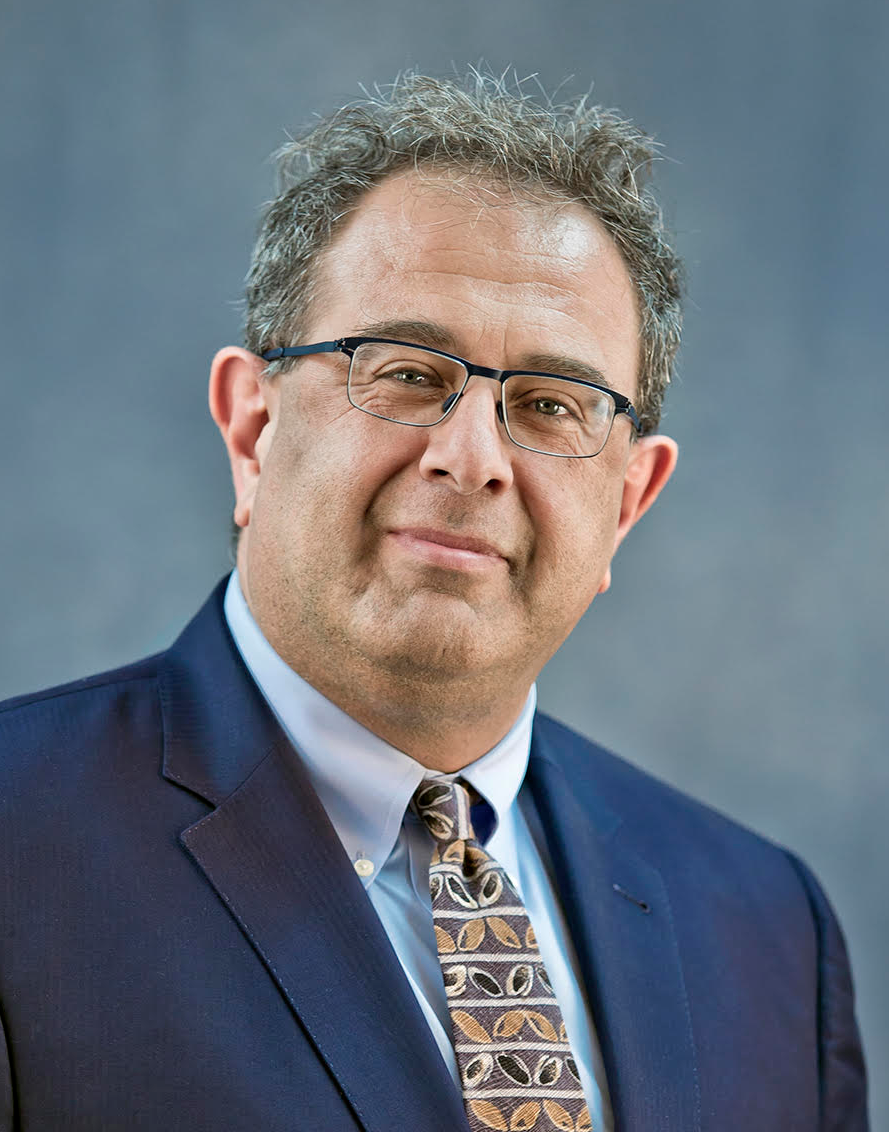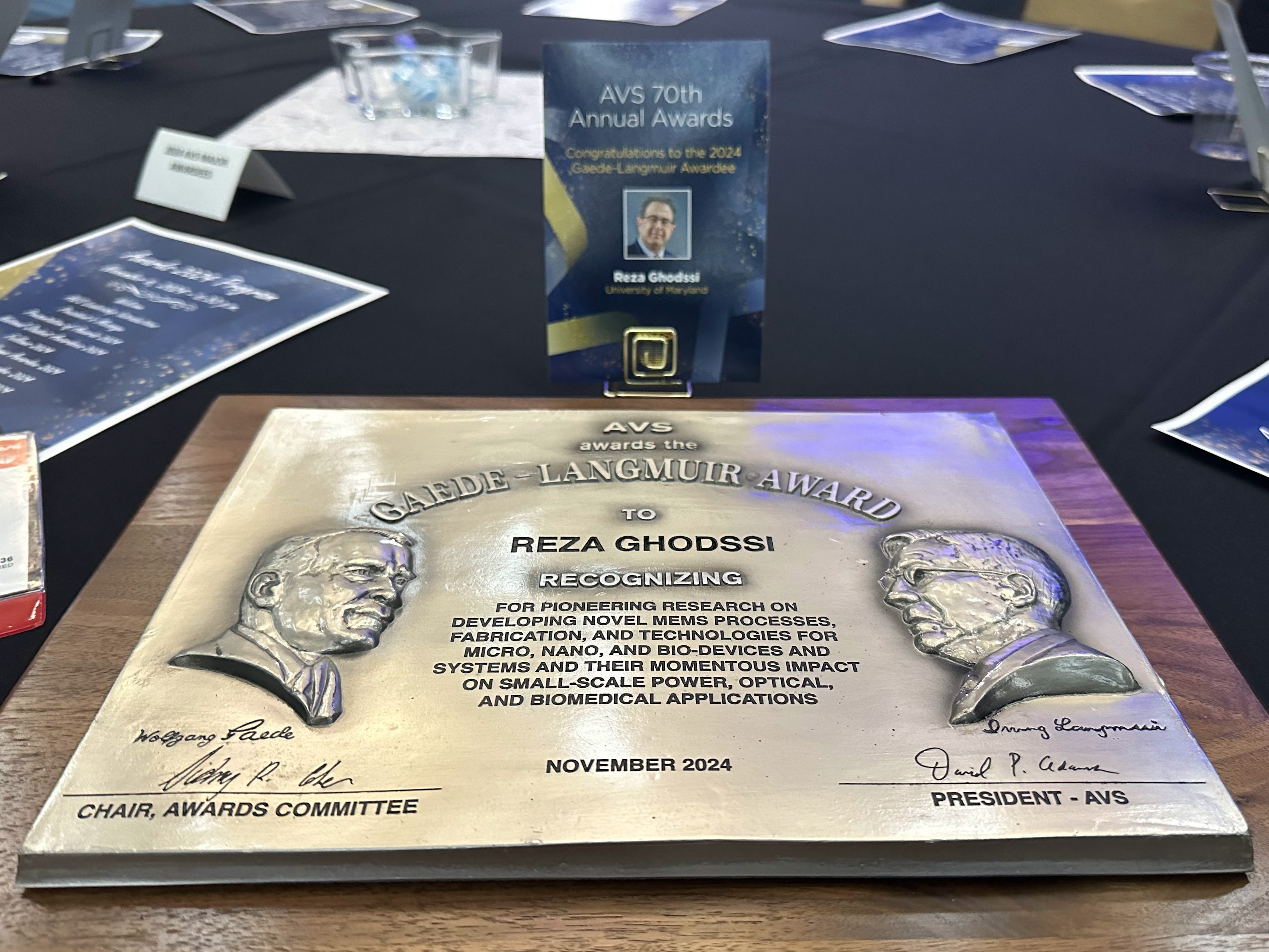 |

|
 |
Professor Reza Ghodssi (ECE/ISR/Fischell Institute), Herbert Rabin Distinguished Chair in Engineering at the University of Maryland and Executive Director, MATRIX Lab. |
|
Professor Reza Ghodssi (ECE/ISR/Fischell Institute), Herbert Rabin Distinguished Chair in Engineering at the University of Maryland (UMD), has received the 2024 Gaede-Langmuir Award from AVS: Science and Technology of Materials, Interfaces, and Processing.
The organization, formerly known as the American Vacuum Society, honored Ghodssi for "pioneering research on developing novel microelectromechanical systems (MEMS) processes, fabrication, and technologies for micro, nano, and bio-devices and systems and their momentous impact on small-scale power, optical, and biomedical applications."
 Ghodssi, Executive Director of Research and Innovation of the A. James Clark School of Engineering's MATRIX Lab in Southern Maryland, a UMD Distinguished Scholar-Teacher, and a former Institute for Systems Research (ISR) Director, has led the MEMS Sensors and Actuators Laboratory (MSAL) since its inception in 2000. The group spearheads innovative biomedical and clinical applications related to gastrointestinal diagnostics, biofilm monitoring and inhibition, and gut-brain interaction. Complementing this research, the lab also has been helping to develop novel solutions for energy storage, harvesting, and conversion. Ghodssi, Executive Director of Research and Innovation of the A. James Clark School of Engineering's MATRIX Lab in Southern Maryland, a UMD Distinguished Scholar-Teacher, and a former Institute for Systems Research (ISR) Director, has led the MEMS Sensors and Actuators Laboratory (MSAL) since its inception in 2000. The group spearheads innovative biomedical and clinical applications related to gastrointestinal diagnostics, biofilm monitoring and inhibition, and gut-brain interaction. Complementing this research, the lab also has been helping to develop novel solutions for energy storage, harvesting, and conversion.
Since 2017, MSAL has been developing an ingestible capsule that can identify and treat diseases of the gastrointestinal tract. The latest innovations for this device are described in "Magnetically triggered ingestible capsule for localized microneedle drug delivery," in the August 16, 2024 issue of Device, a Cell Press journal. Ghodssi and his lab have pioneered a remotely triggerable local drug injection system that can be directly controlled with external magnets, using dissolvable microneedles. Although not yet available to the medical community, this advance points to the day clinicians could use an ingestible capsule to better treat intestinal diseases.
The Gaede-Langmuir Award, established in 1977, recognizes and encourages outstanding discoveries and inventions in the sciences and technologies of interest to AVS, namely materials, interfaces, and processing. The award is bestowed in even-numbered years. A nominee must have made a major contribution to the sciences, in the nature of a new invention, process or discovery. It includes significant advances in theory, the discovery of a new effect, phenomenon or process, or the invention of a novel device, instrument, technique or measurement. It is one of the premier honors bestowed by AVS.
Receiving the Gaede-Langmuir award is particularly meaningful because of the crucial role AVS has played in the development of MEMS, and in his own career. Ghodssi said.
"It feels like coming full circle," he said. "As a first-year graduate student, I gave my first talk with them, and later, I received an AVS graduate research award. After I joined the UMD faculty, several of my own graduate students received the same award, and I became an AVS Fellow. I feel honored and humbled to be recognized in this way by an organization that has been so important to me over the years."
It also amounts to recognition of the MEMS field itself, which has undergone dramatic transformations since its early days, Ghodssi said. "The award highlights the importance of the MEMS field and its contributions to the broader community of processes, fabrications, and technologies in the world of semiconductors and sensors,” he said. “By recognizing me and the work done by my group, AVS is also recognizing the Clark School, UMD. and the entire MEMS community."
A UMD faculty member since 2000, Ghodssi received his bachelor’s, master’s, and Ph.D. degrees from the University of Wisconsin-Madison, with his doctoral dissertation focusing on the development of novel fabrication processes and technologies for high aspect ratio micro structures and devices. He also spent three years at the Massachusetts Institute of Technology (MIT), first as a post-doctoral researcher and then as a research scientist, prior to joining the UMD faculty.
Ghodssi is the second UMD faculty member to receive the award. Distinguished University Professor and former ISR Director Gary Rubloff (MSE/ISR) won the award in 2000 in recognition of his "inventive application of surface science and vacuum technology to the semiconductor industry, and for fostering an effective bridge between AVS research and manufacturing."
Ghodssi received the award at the AVS 70th International Symposium and Exhibition, held in Tampa, FL from Nov. 3–8.
Related Articles:
University of Maryland Research is Redefining Health Care
Adjustable Drug Release Marks New Milestone in Ingestible Capsule Research
Research Paper and Cover Art Now Feature Article in Journal
Ingestible Capsule Advances May Lead to Earlier Detection of Diseases
New features on ingestible capsule will deliver targeted drugs to better treat IBD, Crohn’s disease
Ingestible Capsule Technology Research on Front Cover of Journal
Gut Health Monitoring Gas Sensors Added to Ingestible Capsule Technology
New ‘FRRB’ packaging technology may solve an ingestible capsule challenge
Ghodssi invited speaker at NIMH workshop on sensor technologies to capture the complexity of behavior
MSAL’s work on serotonin characterization and detection results in two journal covers
July 17, 2024
|

